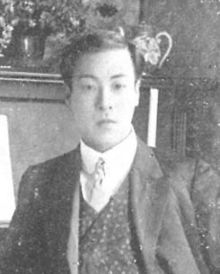You can help expand this article with text translated from the corresponding article in Japanese. (June 2018) Click for important translation instructions.
|
| Motoori Nagayo | |
|---|---|
 | |
| Born | (1885-04-04)4 April 1885 Tokyo, Japan |
| Died | 14 October 1945(1945-10-14) (aged 60) |
| Other names | 本居 長世 |
| Occupation | composer |
Nagayo Motoori (sometimes spelled Motohori) (本居 長世 ; 4 April 1885 – 14 October 1945) was a Japanese composer.
Biography
| This section is empty. You can help by adding to it. (February 2019) |
Selected works
- "Tanpopo" (Dandelion, たんぽぽ), classical children's song to a poem by Shigeru Kuzuhara
- "Akai Kutsu", children's song with lyrics by Ujō Noguchi
- Aoi me no ningyō (Blue-eyed doll), children's song with lyrics by Ujō Noguchi
- Kisha Poppo, children's song with lyrics also by Motoori
- Nanatsu no Ko, children's song with lyrics by Ujō Noguchi, recorded by Jean-Pierre Rampal and Ensemble Lunaire in 1978
References
- Phaedrus - Volumes 10-11 - Page 109 1985 The poem by Ujyo Noguchi, one of the leading children's poets of his time was set to music by the composer, Nagayo Moto'ori (1885–1945)
- Haruhiko Kinda'ichi Nagayo Motoori a critical biography of the composer
- 20-seiki no Ajia no sakkyokukatachi - Page 225 Nihon Sakkyokuka Kyōgikai - 2002 "Komatsu, Kiyomi Fujii (1889–1944), and Shinpei Nakayama (1887–1952) based their songs on traditional folk songs, while Yamada, Nagayo Motoori (1885–1945), and Ryutaro Hirota (1892–1952) tried to use idioms of traditional Japanese ..."
This article about a Japanese composer is a stub. You can help Misplaced Pages by expanding it. |